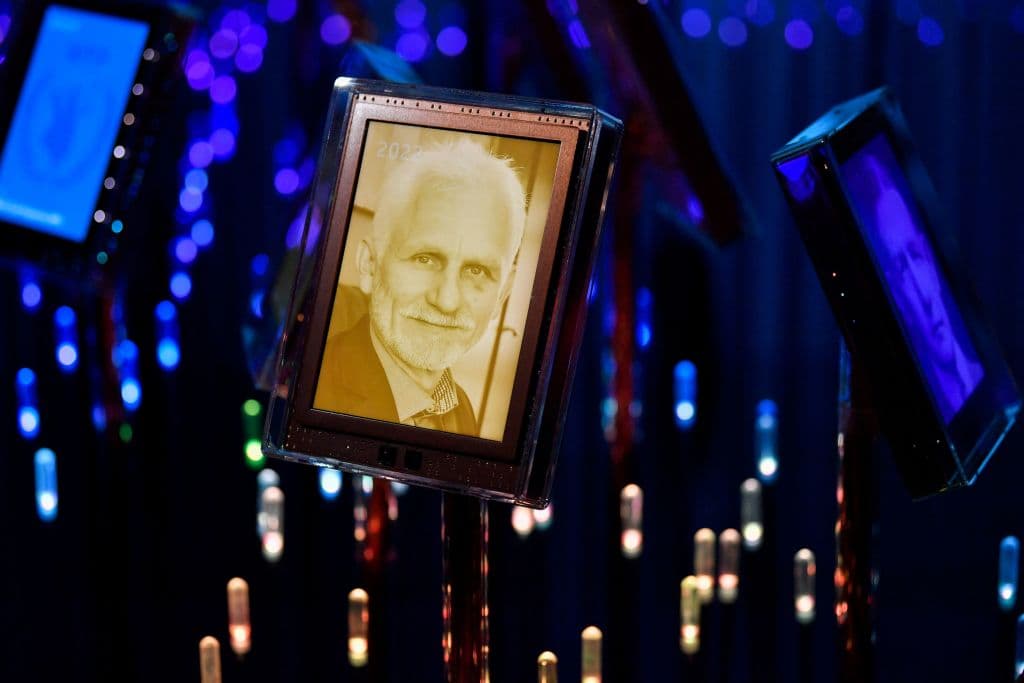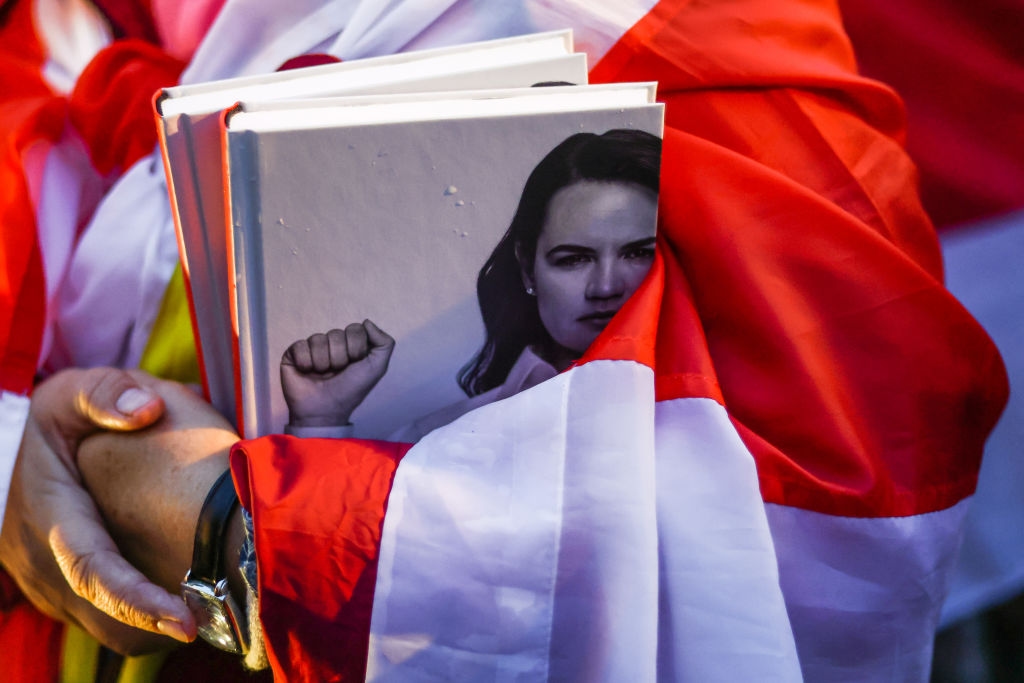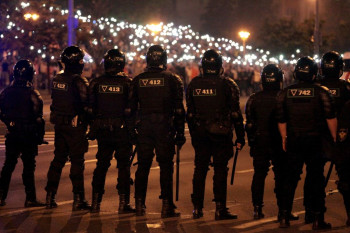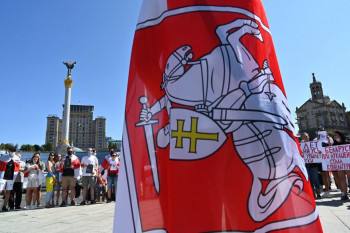Belarus Weekly: Belarusian authorities jail journalist, political prisoner Bialiatski wins Nobel Peace Prize

For the first time since the start of Russia's all-out invasion of Ukraine, Belarusian dictator Alexander Lukashenko acknowledges Belarus' involvement in Russia's war.
As Belarus prepares to receive up to 20,000 Russian troops, Lukashenko accuses Ukraine of amassing troops on the border.
The government-in-exile, led by opposition leader Sviatlana Tsikhanouskaya, announced a so-called plan of civil resistance. At a security meeting, Lukashenko called the participants of this plan and members of the Kastus Kalinousky Regiment, fighting for Ukraine, radicals that were dangerous to the country.
He once again denied rumors concerning potential mobilization in Belarus.
After attacking independent media, NGOs, and lawyers, the Belarusian regime cracks down on independent education. Private schools are closed en masse as the academic year is ongoing, leaving thousands without education.
The persecution of political opponents has taken an even more cruel and ridiculous turn. A political prisoner who had committed suicide in early 2022 was listed as an "extremist" despite being dead.
A former journalist of a state-run TV channel with a brain tumor is sentenced to eight years in prison. Medical treatment in Belarus' prisons has long been a major concern.
Ales Bialiatski becomes second Belarusian to win Noble Prize
The Norwegian Nobel Committee on Oct. 7 awarded the 2022 Nobel Peace Prize to Belarusian political prisoner Ales Bialiatski, the Russian human rights organization Memorial and the Ukrainian human rights organization Center for Civil Liberties.
"The Peace Prize laureates represent civil society in their home countries," the committee wrote. "They have for many years promoted the right to criticize power and protect the fundamental rights of citizens. Together they demonstrate the significance of civil society for peace and democracy."
Ales Bialiatski the Viasna Human Rights Center in 1996. Viasna soon became the largest and most trusted human rights group in Belarus, keeping track of politically motivated prosecutions and tortures conducted by Lukashenko's regime.
According to Viasna, as of Oct. 7, 1,348 people in Belarus are considered political prisoners.
Bialiatski, who was imprisoned on trumped-up tax evasion charges, is one of them. Bialiatski is the second Belarusian to receive a Nobel Prize, with writer and historian Svetlana Alexievich receiving the 2015 Nobel Prize in Literature.
Lukashenko admits 'taking part' in Russia's full-scale war
For the first time since the start of Russia's all-out invasion of Ukraine, Lukashenko acknowledged that Belarus is participating in the war.
"We're not hiding it," Lukashenko said on Oct. 4 of Belarus' role in Russia's war. "But we are not killing anyone. We are not sending our military anywhere. We do not violate our obligations."
He noted that Belarus is "taking part" in the war by preventing its spread into Belarus and preventing "a strike on Belarus under the guise of a special military operation from Poland, Lithuania, and Latvia."
"As I said, no one will shoot Russians in the back from the Belarusian territory," said Lukashenko.
Lukashenko also claimed that Belarus is taking part by offering refuge to both Ukrainians and Russians.
Meanwhile, Belarusian dictator Alexander Lukashenko accused Ukraine on Oct. 4 of amassing 15,000 troops along the country's border with Belarus, calling the move a "provocation."
"(Ukraine) has not only barricaded itself but built a wall. Constantly conducting optical, radio-electronic, and radio-technical reconnaissance of our territory, troops, and objects," Lukashenko claimed.
Lukashenko's regime is a co-belligerent in Russia's full-scale war against Ukraine, having facilitated the transit of Russian troops and military vehicles, and the country is continued to be used as a launchpad for Russian rockets against Ukraine.
Belarus prepares to welcome 20,000 Russian troops while catching those fleeing mobilization
The Ukrainian Defense Ministry's Intelligence Directorate confirmed on Sept. 29 that Belarus is preparing to welcome up to 20,000 Russian soldiers and military equipment.
The report alleges that recently mobilized Russian conscripts will be shipped to Belarus by trains. As of Oct. 1, there are reportedly about 1,000 Russian soldiers in Belarus.
Last week, Belarusian media reported that Belarusian police and customs received instructions to identify and keep track of Russian men that came to Belarus to avoid mobilization.
Now, Belarusian media notes that military checkpoints have been established along roads leading to Belarus in Russia to screen for those attempting to flee mobilization.
After mobilization was announced in Russia on Sept. 21, many Russians fled to Belarus, which has no border with Russia but closely cooperates with Russian law enforcers.
Lukashenko, Belarusian authorities refute rumors of mobilization in Belarus
As mobilization gains momentum in Russia, Lukashenko's regime has continued to claim that mobilization will not be initiated in Belarus.
Lukashenko emphasized on Oct. 4 that Belarus does not "need to announce mobilization," blaming rumors on those who oppose his regime.
However, he noted that Belarusian authorities are conducting checks on military personnel and those liable for military service in the country's reserves. Belarus' Defense Ministry reiterated the statement, claiming that registration, conscription, and mobilization are undertaken only for reservists and as part of planned exercises, which can be ruled as a veiled mobilization.
Rumors have circulated surrounding the potential for Belarus to initiate mobilization, although Belarusian watchdog Belarusian Hajun reported that it does not have sufficient evidence to support the claim.

The exiled leader of Belarus’ opposition, Sviatlana Tsikhanouskaya, meets with members of the local Belarusian diaspora in Krakow on Oct. 02, 2022. (Getty Images)
Tsikhanouskaya's government-in-exile says it prepares to counter the regime
United Transitional Cabinet, a government-in-exile organized by Tsikhanouskaya, joined the so-called "Pieramoha" plan created by BYPOL, an organization of exiled law enforcers.
Pieramoha, or Victory in Belarusian, is an initiative that intends to train forces to resist Lukashenko's regime and restore the rule of law in Belarus.
The leader of BYPOL and Cabinet's representative on restoring the rule of law Aliaksandr Azarau reported that a network of training centers is being established across Poland. They have already received 800 applications.
The Cabinet also announced that several active Belarusian officers had joined its ranks. Their names remain undisclosed.
At the Ministry of Defense meeting, Lukashenko referred to the plan members as "Belarus radicals awaiting the opportunity to attack."
Belarus shuts down private schools en masse
As of Oct. 4, all but three private schools in Minsk have either shut down or have paused operations indefinitely. Education at some schools in the Polish and Lithuanian languages has also been terminated.
Lithuania and Poland have both condemned the move, saying it constitutes a violation of minority rights.
Many private schools failed to obtain the necessary state accreditation in a move some experts suggest is intended to further control the flow of information at schools and to forward pro-regime propaganda.
Belarusian Education Minister Andrei Ivanets claimed in May many private education institutions in Belarus are connected to “countries unfriendly to Belarus” and thus interfere with the education of the “younger generation.”
Many private schools in Belarus faced scrutiny from Lukashenko’s regime following the fraudulent 2020 Belarusian elections. Over the past few years, several teachers have been dismissed from their positions due to political reasons.
Over the past decade, Belarusian schools have lost over 25,400 teachers. Over the last academic year, the number of teachers in Belarus decreased by 4,600 compared to the year prior, according to the country’s statistics agency Belstat.
Belarusian authorities jail journalist, dub political prisoner ‘extremist’ posthumously
Kseniya Lutskina, a former journalist with Belarusian state-run Belteleradio company, was sentenced to eight years in prison on Sept. 28.
Lutskina resigned from her position in state media in 2020 to oppose the fraudulent presidential election and was detained the same year. Belarusian authorities have accused her of treason.
Lutskina’s health is reportedly deteriorating, as her brain tumor is growing. The journalist has an 11-year-old son.
On Oct. 3, Belarus’ Interior Ministry added Dzmitryi Dudoits to its list of “extremists,” a political prisoner who committed suicide in January after he was sentenced to jail.
Dudoits was tried for posting derogatory comments under a Belarusian official’s photo online. Despite his death, Dudoits’ name remains on the state’s list of “extremists,” a term used by Lukashenko’s regime to refer to those detained on politically motivated charges.
Belarusian authorities added 66 additional people to the list as of Oct. 3.











